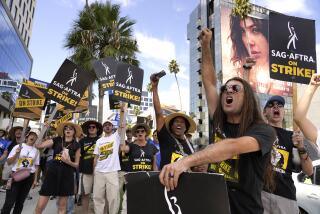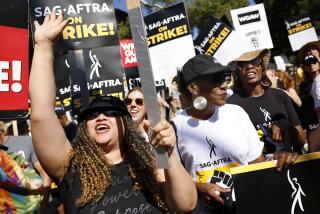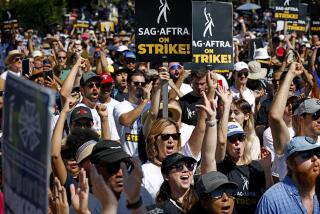Jobless and hopeless in America
- Share via
Thousands of long-term unemployed Americans from across the country have converged on Washington this week to dramatize their plight and to urge Congress to extend federal unemployment insurance benefits and the payroll tax cut, and to pass President Obama’s jobs bill.
According to the U.S. Bureau of Labor Statistics, 13.3 million Americans are unemployed. Nearly half have been jobless for more than six months — a record. If you add workers who are so discouraged that they’ve given up looking for work, and people who are underemployed (working part time but who want full-time jobs), the number of jobless Americans skyrockets to more than 25 million.
After remaining at or over 9% since March 2009, the nation’s jobless rate dipped to 8.6% in November. But in California, the rate is 11.7%. For more than 21/2 years, the number of jobless Americans has outstripped the number of available job openings by more than 4 to 1.
In such dire circumstances, the least Congress can do is extend unemployment benefits. The Obama administration and House and Senate Democrats are pushing for another yearlong extension of federal benefits before they expire Dec. 31. Without action, nearly 2 million Americans — 305,400 in California — would be cut off from unemployment insurance in January alone; 6 million would be cut off over the course of the next year.
Historically, whenever the jobless numbers are this severe, Congress has extended jobless benefits to help keep families and local economies afloat. In fact, Congress has never allowed unemployment insurance to expire with the jobless rate above 7.2%.
Last year, congressional Republicans opposed extending jobless benefits but were outvoted by the Democrats. Now the Republicans aren’t saying they outright oppose an extension, because that would be unpopular in hard-hit states like Ohio, Speaker John A. Boehner’s home state. Instead, they’ve added a poison pill, insisting that any extension of unemployment benefits be paid for by making other cuts, which will shed even more jobs. The Democrats have proposed paying for the extension of jobless benefits and the payroll tax cut with a tax increase on those making more than $1 million a year, a plan that Republicans oppose.
In other words, the Republicans are more willing to provide tax breaks for the rich than unemployment benefits for the jobless.
Most unemployed Americans are out of work through no fault of their own but because the economy isn’t generating enough jobs. But GOP lawmakers have cruelly claimed that many jobless Americans are simply too lazy to look for work and take advantage of unemployment insurance.
House Republican Policy Committee Chairman Tom Price of Georgia said that Congress should reduce benefits, decrease the amount of time an individual can receive them and eventually “wean folks off” of them. House Majority Leader Eric Cantor of Virginia has said that “for too long in Washington now we’ve been worried about pumping up the stimulus monies and pumping up unemployment benefits.” Sen. Jon Kyl, an Arizona Republican, claimed that “continuing to pay people unemployment compensation is a disincentive for them to seek new work.”
They are recycling misleading arguments that business groups have made since the unemployment insurance program was initially proposed during the Depression. Testifying before Congress in 1934, James L. Donnelly of the Illinois Manufacturers Assn. warned that taxing employers to contribute to the unemployment insurance fund “would render business recovery absolutely hopeless.” It would also, Donnelly claimed, “undermine the fabric of our economic and social life by destroying initiative, discouraging thrift and stifling individual responsibility.”
These arguments were wrong then, and they’re wrong now. Unemployment insurance doesn’t make people lazy or dampen their desire to find work. It simply helps them pay the rent and put food on the table. A July 2010 report by the Joint Economic Committee of Congress reviewed decades of economic studies to see if unemployment insurance benefits inhibited unemployed workers from vigorously looking for or accepting a new job. “Those fears,” the report concluded, “are unfounded.” A different study last year by the Federal Reserve Bank of San Francisco reached the same conclusion.
The reality is that workers can barely survive on jobless benefits, which average only 74% of a poverty level income for a family of four. In California, weekly unemployment benefits average $295. Nationwide, most people who receive benefits say that the money isn’t enough to meet basic needs, according to a New York Times/CBS News poll of jobless Americans in October. As a result, most unemployed workers receiving insurance continue to look for work.
Moreover, unemployment insurance puts money into people’s pockets and thus pumps money into local economies — grocery stores, gas stations, landlords and utilities. A study this year by the Urban Institute found that employment insurance creates $2 in economic activity for every $1 the government spends. The Economic Policy Institute estimates that extending unemployment benefits through next year would create $70 billion in economic activity and a 0.4% increase in GDP. The Census Bureau found that unemployment insurance kept 3.2 million Americans, including nearly 1 million children, from falling into poverty last year.
Long-term joblessness is a personal and economic disaster. People often lose their health insurance, lose their homes through eviction or foreclosure, suffer depression and fall into poverty. “Hardly Working,” a new report by USAction, a national coalition of citizen groups, found a growing despair among the unemployed and the underemployed about their futures and the future of the country.
Almost every American knows at least one person who is out of work. It’s time for Congress to help working families by extending jobless benefits, and then to create millions of jobs to put America back to work.
Peter Dreier teaches politics and chairs the Urban & Environmental Policy Department at Occidental College. His latest book, “The 100 Greatest Americans of the 20th Century: A Social Justice Hall of Fame,” will be published next year.
More to Read
Get the L.A. Times Politics newsletter
Deeply reported insights into legislation, politics and policy from Sacramento, Washington and beyond. In your inbox three times per week.
You may occasionally receive promotional content from the Los Angeles Times.










